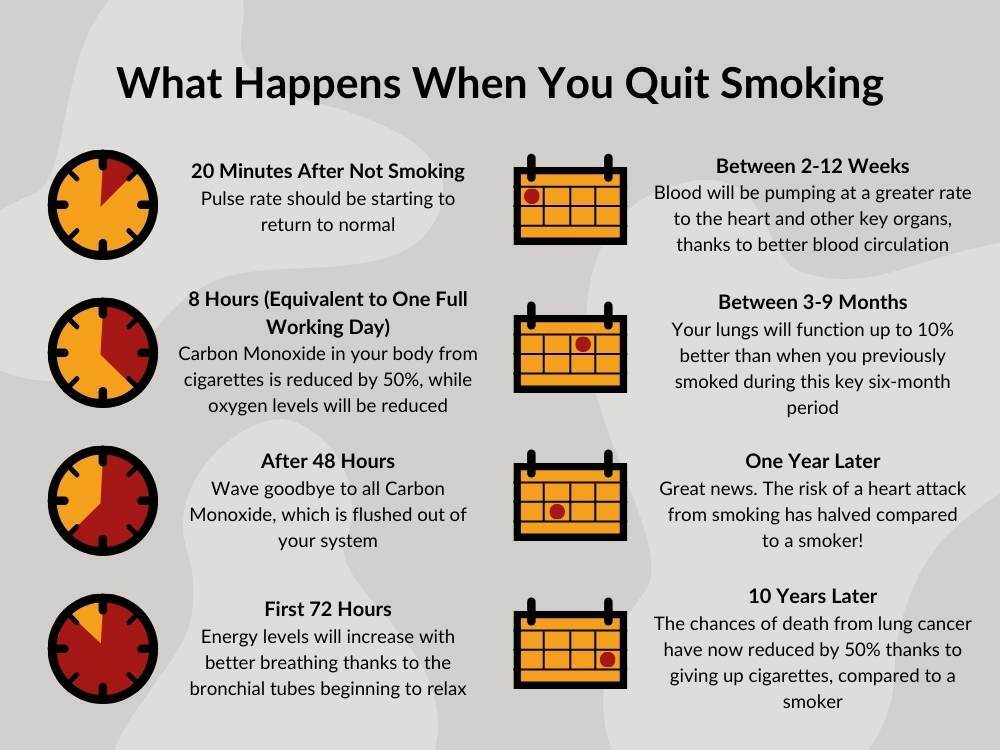How to Quit Smoking Guide
18th Apr 2024

Spring is upon us, a symbol of a new transformation from the cold of winter to flowers blooming and the warmer weather. But is it a new you? At this time, we always reflect on change, new beginnings, and what we can accomplish moving forward. One goal many targets is to quit smoking, as soon as possible.
For millions in the UK, quitting smoking is a difficult challenge. This is only natural, considering its addictive and habitual nature. Last year, NHS statistics showed in the first quarter that only 54% using stop smoking services self-reported that they quit.
Rest assured it is possible, with a combination of willpower, the right guidance, and the best methods to help you get there.
There are a million reasons why now is a good time to quit. For good physical and mental health, and to help those closest to you who feel the passive effects of smoking. This guide explains how best to quit smoking for good.

Why is Giving Up Smoking So Difficult?
Because people who smoke associate the habit with so many parts of their day, from when they wake up, to relieving stress at work, or a dopamine hit after dinner, this can create doubt and fear of breaking that routine or mindset.
As explained by the Mental Health organisation, the nicotine inside cigarettes ‘stimulates the release of the chemical dopamine in the brain', which then ‘triggers positive feelings’.
It’s not only a psychological challenge to put down cigarettes for good but a physical addiction too. Even one or two hours after quitting smoking, the withdrawal symptoms can begin to kick in.
The reason someone may be smoking, how they started the addiction or their difficulties attempting to quit is different for each individual and part of the story. One teenager might be smoking to fit in with friends. Another smoker might be using it as a coping mechanism for depression.
Some even use it as a dietary measure because nicotine suppresses appetite. A smoker may continue with the habit to avoid putting on weight (this does happen but is not advised).
It is up to the smoker to find different methods, activities, or pleasures to replace the temporary feeling you get from cigarettes that is negatively affecting your overall health. Those issues will remain after smoking, so it’s recognising those cues and finding a different source of happiness which will improve your overall health.
What is the Most Successful Way to Stop Smoking?
The statistics from the NHS in the introduction above highlight that not everybody can stop smoking, at least with the first attempt. It is not recommended to go cold turkey and suddenly stop with no support, because of the withdrawal symptoms from nicotine. But there are a bunch of ways you can aid your body and mind to make that first hurdle.
And remember, what works for one person you may know who has quit could be completely different for you.
There is not one exact science or trick that works for all to put down that final cigarette for good. In recent times, an e-cigarette has proved a very popular method to help smokers quit, while costing less in the process.
Let’s think about why it has been so successful. The habit itself by nature – holding a product in the hand and inhaling the product to then release its content – is the same as smoking. There are far less dangerous toxins in vape e-liquids but importantly an e-liquid can still contain nicotine.
This helps smokers quit because you can continue with the routine of inhaling a nicotine product but when vaping you can gradually drop the levels, starting at an equivalent strength to the amount you smoked and working your way down at a pace that suits.
In addition, crucially the vaper can pick the nicotine strength that suits their smoking habits. Other successful ways people have quit smoking in the past, and are advised by the NHS alongside e-cigarettes, are nicotine patches, nicotine gum, sprays and lozenges.
However, sometimes people find one product on its own is not enough to quit successfully. For many, a combination of tools and methods are required, alongside emotional support, such as counselling, or quitting with a friend or family member at the same time.
Here are a few tips that may help you zone in on that goal:
Top Quitting Tips
- Write down the reasons why quitting is important to you, whether that’s health, financial, time spent outside smoking in the cold – whatever it may be.
- Use a combination of services or tools to quit, such as e-cigarettes, nicotine patches, gum, or other nicotine replacement therapies, as well as NHS support and counselling if needed.
- Mention to friends and family you’re planning on quitting.
- Quit the same time as a friend or family member so working towards a goal together!
- If it’s not your first attempt quitting, remember what worked well to not be tempted for a cigarette and try to avoid the reasons you may have relapsed previously by making changes.
- Focus on something else with your mind and hands at the time of urgency.
- Write down any smoking triggers and a few hints to help combat these.
- Get on the treadmill, go for a walk or bike, explore nature, hit the gym weights, any sort of exercise will help you!
- Pick a date and stick to it.
- Get rid of all cigarettes remaining in the house, or things that will remind you of cigarettes, such as the smell on any clothes and furniture within the house.
- Write down the reasons why quitting is important to you, whether that’s health, finances, time spent outside smoking in the cold – whatever it may be.
- Use a combination of services or tools to quit, such as e-cigarettes, nicotine patches, gum, or other nicotine replacement therapies, as well as NHS support and counselling if needed.
- Mention to friends and family you’re planning on quitting.
- Quit at the same time as a friend or family member to work towards a goal together!
- If it’s not your first attempt quitting, remember what worked well to not be tempted by a cigarette and try to avoid the reasons you may have relapsed previously by making changes.
- Focus on something else with your mind and hands at a time of urgency.
- Write down any smoking triggers and a few hints to help combat these.
- Get on the treadmill, go for a walk or bike, explore nature, hit the gym weights, and any sort of exercise will help you!
- Pick a date and stick to it.
- Get rid of all cigarettes remaining in the house, or things that will remind you of cigarettes, such as the smell on any clothes and furniture within the house.
How Long Does It Take to Quit Smoking?
The length of time it takes to quit cigarettes for good can vary based on a wide range of factors. For one person it can just be the case of recognising how much cigarettes are costing and giving up there and then with no issues. For another person, they may relapse after days, weeks or months, and take several attempts to permanently quit.
How long it takes is on you, and to be truly successful, it should be done at your own pace! If you go cold turkey and go through the nicotine withdrawal symptoms, it is expected to take roughly three months on average to ease off a nicotine addiction and feel comfortable quitting with no reaction.
It’s possible to quit cold turkey but a tough process, which causes many to return to cigarettes. This is why the NHS stop smoking services, nicotine replacement therapies, counselling, or a combination of all three can all help in your quit-smoking journey. Smoking numbers are falling as the government sets out plans for the UK to be smoke-free by 2030, but can vaping speed up the process?
Organisations like the NHS, Cancer Research UK, ASH, and the British Lung Foundation all suggest even without long-term evidence that e-cigarettes can be a useful way to wean off nicotine slowly and offer less harm as a product that you inhale. This is simply because it has less tobacco. The time it takes to quit smoking may be swifter and longer lasting (or even permanent) for adults who need it, with the right type of vape kit.

Quit Smoking Timeline - What Happens When You Stop Smoking?
Your body and mind will thank you when you put down the final cigarette and embark on a path of discovery to lead a better life. You’ll improve your health and gain more wealth when you do so. Even just 20 minutes after smoking you’ll notice a difference – it's that quick! The changes are significant and life expectancy will increase once you wave goodbye to cigarettes for good.
Success Stories at V2 Cigs UK

Q And A With James – V2 Cigs Employee
1. What was your main reason (or reasons) for giving up cigarettes? Was there a major motivating factor?
Having a family and health concerns about smoking cigarettes. Also, the bad smell!
2. Did you go cold turkey first? Try a vape as well as cigarettes, or make the switch straight away and remove cigarettes?
I tried weaning myself off Cigs by just smoking less, then stopping but then turning to the occasional cigar (when socialising), this soon became a problem – as again it is bad for your health. I turned to vaping later and it worked to help me stop smoking completely.
3. What did you do that helped you quit smoking? Any habits you picked up or things you did to put your mind elsewhere that made quitting easier?
I just avoided the habits that I related to smoking. For example, I would like to smoke after a meal – so rather than smoking I would do a household chore to take my mind off smoking or chewing gum. The hardest was the habit of smoking whilst having a pint with friends – I then vaped instead. I also tried Nicotine Gum – which worked well too.
4. Did you use any support services/help from friends to quit?
No
5. What was your first device and how did it go using it?
I first used a shisha-type model (can remember the brand – with the wicks and a refillable tank) – I used it quite happily for a while – and then started using an Aspire product for many years – all have worked well.
6. Did you successfully quit at the first attempt?
Not quite, I started smoking cigars for a while, after quitting cigars at least when moving to vaping / family pressure
7. If it took more than one attempt, what was the contributing factor that helped to make a difference?
Money saving
8. How did you feel initially and now after quitting cigarettes?
Not too bad, I didn’t miss the smell of smoking and standing alone outside a pub. There was a month or so of feeling a bit irritable, but that soon goes.
9. Any tips for people looking to quit who followed the same path as you?
Trying moving over to vaping – it really helps with the ‘something to do with your hands’ and with modern vapes, it really can feel like you are smoking in terms of the clouds / taking a draw etc. Make sure you match the strength of nicotine and really research the best brands, and flavours of e-liquids – this really helps when you enjoy the flavours you are using and they ‘satisfy’ your nicotine cravings.
Ask for help and advice on the strength of nicotine e-liquids based on your smoking amount per day (be honest about how many you smoke) – then gradually reduce the nicotine strength over time. Do try lots of brands a flavours – you soon find the ones you love.
Read our disclaimer on Vaping and Smoking Cessation
